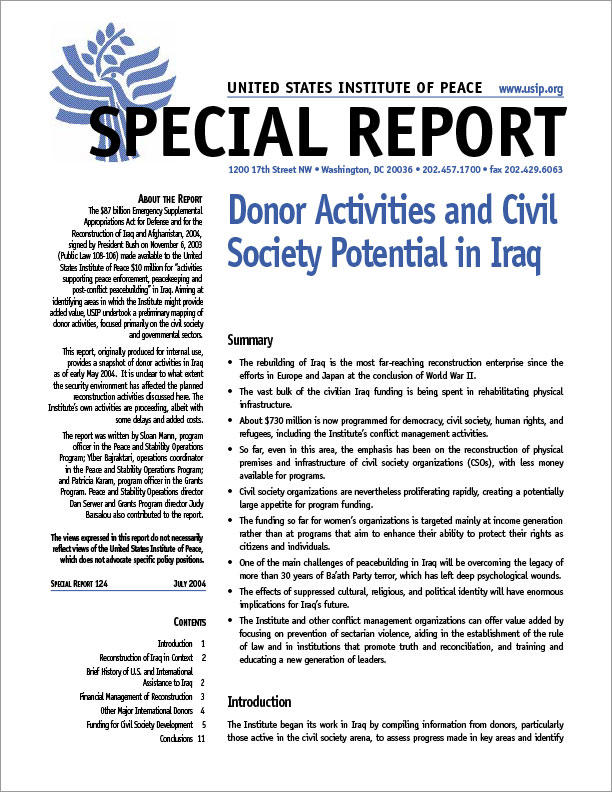The $87 billion Emergency Supplemental Appropriations Act for Defense and for the Reconstruction of Iraq and Afghanistan, 2004, signed by President Bush on November 6, 2003 (Public Law 108-106) made available to the United States Institute of Peace $10 million for “activities supporting peace enforcement, peacekeeping and post-conflict peacebuilding” in Iraq. Aiming at identifying areas in which the Institute might provide added value, the Institute undertook a preliminary mapping of donor activities, focused primarily on the civil society and governmental sectors.

Summary
- The rebuilding of Iraq is the most far-reaching reconstruction enterprise since the efforts in Europe and Japan at the conclusion of World War II.
- The vast bulk of the civilian Iraq funding is being spent in rehabilitating physical infrastructure.
- About $730 million is now programmed for democracy, civil society, human rights, and refugees, including the Institute’s conflict management activities.
- So far, even in this area, the emphasis has been on the reconstruction of physical premises and infrastructure of civil society organizations (CSOs), with less money available for programs.
- Civil society organizations are nevertheless proliferating rapidly, creating a potentially large appetite for program funding.
- The funding so far for women’s organizations is targeted mainly at income generation rather than at programs that aim to enhance their ability to protect their rights as citizens and individuals.
- One of the main challenges of peacebuilding in Iraq will be overcoming the legacy of more than 30 years of Ba’ath Party terror, which has left deep psychological wounds.
- The effects of suppressed cultural, religious, and political identity will have enormous implications for Iraq’s future.
- The Institute and other conflict management organizations can offer value added by focusing on prevention of sectarian violence, aiding in the establishment of the rule of law and in institutions that promote truth and reconciliation, and training and educating a new generation of leaders.
About the Report
The $87 billion Emergency Supplemental Appropriations Act for Defense and for the Reconstruction of Iraq and Afghanistan, 2004, signed by President Bush on November 6, 2003 (Public Law 108-106) made available to the United States Institute of Peace $10 million for “activities supporting peace enforcement, peacekeeping and post-conflict peacebuilding” in Iraq. Aiming at identifying areas in which the Institute might provide added value, the Institute undertook a preliminary mapping of donor activities, focused primarily on the civil society and governmental sectors.
This report, originally produced for internal use, provides a snapshot of donor activities in Iraq as of early May 2004. It is unclear to what extent the security environment has affected the planned reconstruction activities discussed here. The Institute’s own activities are proceeding, albeit with some delays and added costs.
The report was written by Sloan Mann, program officer in the Peace and Stability Operations Program; Ylber Bajraktari, operations coordinator in the Peace and Stability Operations Program; and Patricia Karam, program officer in the Grant Program. Peace and Stability Operations director Dan Serwer and Grants Program director Judy Barsalou also contributed to the report.
The views expressed in this report do not necessarily reflect views of the United States Institute of Peace, which does not advocate specific policy positions.